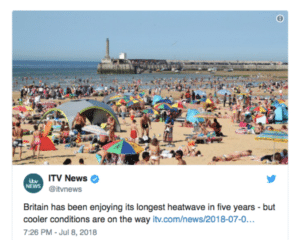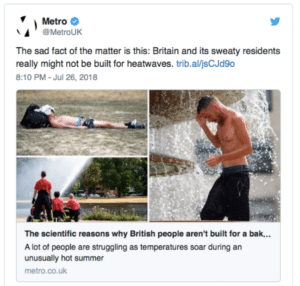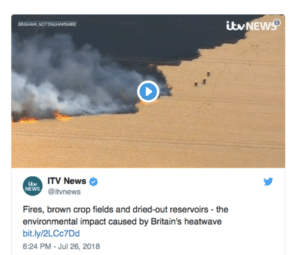OXFORD, England — For more than six weeks, Britain has been sweating through an unusually intense period of hot, dry weather.
This green and pleasant land has rapidly transitioned into something brown and scratchy. Reliably, the British newspapers have dug out the usual tropes: marveling at record-breaking temperatures, fretting about the possibility of melted sidewalks and keeping us well-stocked in images of children frolicking in fountains.
But something looms in the background, linking our spectacular summer to the wildfires burning portentously in the Arctic Circle and Greece, and the extreme heat and rainfall that have ravaged Japan.
Britain is a little red blotch on a global weather map that is saturated with them.
Let’s be clear: That map is a sea of red because the climate is changing. But in Britain we have been stuck — save for a few exceptions that prove the rule — with the no-single-weather-event-is-caused-by-climate-change rhetoric that is not only scientifically outdated (attribution studies can tell us just how much extreme weather events are caused by climate change), but increasingly feels like an abdication of moral responsibility.
The British government announced Thursday that adapting to a warming climate was now a matter of “life and death.” And Thursday’s front pageswere a welcome shift in tone.
But the fact that it took an old-fashioned government news release for us to start talking about climate change after weeks of a historic heat wave is a problem.
There is no conspiracy within the British Broadcasting Corporation (BBC) to deny climate change, even if the BBC has been berated for giving airtime to discredited climate skeptics. Unlike in the American press, there is relatively little outright denial of climate change in the mainstream British news media. But approaches to the reporting of extreme weather events often seem ill-suited to an era defined by a changing climate, as journalists struggle to find the right tone, convey the right level of urgency and context and worry about compromising their neutrality.
Many British climate scientists (especially following the “climategate” controversy, in which emails from the University of East Anglia were made public and used by climate skeptics to accuse academics of withholding data) harbor a similar fear — that speaking out plainly and confidently about the impacts of climate change will lead to them being branded as activists. Campaigners often hesitate and wait in line behind the scientists, fighting to strike the right balance between hope and fear in their portrayal of a changing climate, and instead veering between apocalyptic warnings and unfeasible, optimistic portrayals of a shiny, low-carbon future.
And perhaps most troubling of all, among many Britons there seems to be a tacit agreement that we’re just not going to talk about it: Who wants to mention climate change among friends, only to be met with awkward silence and pegged as the bore who is ruining everyone’s summer of picnics and barbecues? Particularly in a country where summers can be cold, gray and defined by rain that’s only slightly warmer than the winter variety.
Taken together, this amounts to a state of collective paralysis. The world is catching fire before our eyes, the predictions of climate scientists are coming true, and we are either fumbling conversations about the causes or settling for not talking about those causes at all.
Climate change is so unlike any risk we have ever dealt with that we are hamstrung by a basic inability to articulate what it is, or what it means for our lives. But we do not have a choice anymore. There are many things that urgently need to happen to start reining in the climatic changes we have unleashed; deciding how we’re going to talk about those changes is a start.
The British news media need to accept that the changing climate is a story in itself, and not wait for a news release to be hurried out on the hottest day of the year. And no more images of polar bears. Britons do not see ourselves reflected in photos of melting ice; we need a new visual language that can convey the myriad issues like health, farming and tourism that are being affected right now by a changing climate.
For campaigners, it means putting new voices front and center. Environmentalists have done an incredible job in putting climate change on the political agenda, which is why we have world-leading policies like the Climate Change Act, but new messengers are needed to take the story into the mainstream — which means climate campaigns should be led by faith leaders, trusted local businesses and culturally credible spokesmen and spokeswomen like musicians and artists, not just protesters with painted faces and placards.
And for all of us in our daily lives, it means being prepared to call out climate change when we see it.
If we don’t learn to call a heat wave like this what it is, we are doomed to keep repeating the same mistakes over and over again — equivocating, avoiding and getting hotter all the time.
Previously published in the New York Times.
4 responses to Britain, can we — really — talk about this weather we’re having?
Sign up to our newsletter
Thank you for signing up to our newsletter
You should receive a welcome email shortly.
If you do not receive it, please check your spam folder, and mark as 'Not Spam' so our future newsletters go straight to your inbox.




“Climate campaigns should be led by faith leaders, trusted local businesses and culturally credible spokesmen and spokeswomen like musicians and artists, not just protesters with painted faces and placards.”
This is crucial I agree – often these leaders don’t recognise their own importance!
All absolutely valid comments. Climate change has to be taken more seriously by all of us with governments leading the way before it really is too late.
The odd thing about the ‘bystander effect’ is that ca happen at the group level too, so that each climate activist group only makes a half-hearted attempt at organisation as they figure someone else will do the important work. Of course there is no ‘someone else’.
“there seems to be a tacit agreement that we’re just not going to talk about it”
This is the key problem at this time and we have to break through it.
Perhaps we can develop a step-by-step sequence of conversation strategies (1) to bring up the topic and (2) how to respond to the inevitable awkwardness.
Love to hear from others on this…